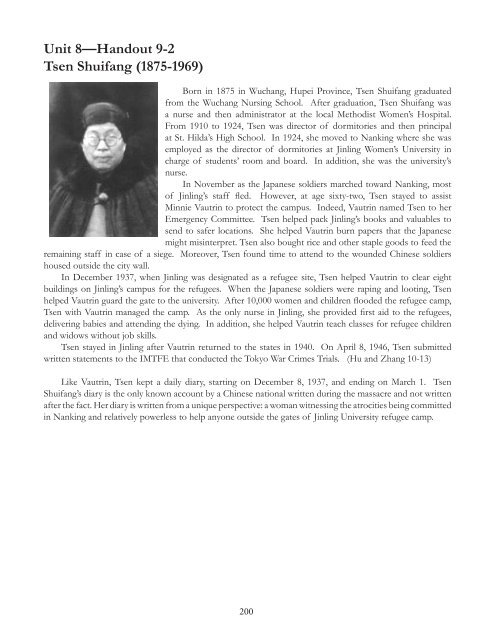Download - Canada ALPHA
Download - Canada ALPHA
Download - Canada ALPHA
Create successful ePaper yourself
Turn your PDF publications into a flip-book with our unique Google optimized e-Paper software.
Unit 8—Handout 9-2<br />
Tsen Shuifang (1875-1969)<br />
Born in 1875 in Wuchang, Hupei Province, Tsen Shuifang graduated<br />
from the Wuchang Nursing School. After graduation, Tsen Shuifang was<br />
a nurse and then administrator at the local Methodist Women’s Hospital.<br />
From 1910 to 1924, Tsen was director of dormitories and then principal<br />
at St. Hilda’s High School. In 1924, she moved to Nanking where she was<br />
employed as the director of dormitories at Jinling Women’s University in<br />
charge of students’ room and board. In addition, she was the university’s<br />
nurse.<br />
In November as the Japanese soldiers marched toward Nanking, most<br />
of Jinling’s staff fl ed. However, at age sixty-two, Tsen stayed to assist<br />
Minnie Vautrin to protect the campus. Indeed, Vautrin named Tsen to her<br />
Emergency Committee. Tsen helped pack Jinling’s books and valuables to<br />
send to safer locations. She helped Vautrin burn papers that the Japanese<br />
might misinterpret. Tsen also bought rice and other staple goods to feed the<br />
remaining staff in case of a siege. Moreover, Tsen found time to attend to the wounded Chinese soldiers<br />
housed outside the city wall.<br />
In December 1937, when Jinling was designated as a refugee site, Tsen helped Vautrin to clear eight<br />
buildings on Jinling’s campus for the refugees. When the Japanese soldiers were raping and looting, Tsen<br />
helped Vautrin guard the gate to the university. After 10,000 women and children fl ooded the refugee camp,<br />
Tsen with Vautrin managed the camp. As the only nurse in Jinling, she provided fi rst aid to the refugees,<br />
delivering babies and attending the dying. In addition, she helped Vautrin teach classes for refugee children<br />
and widows without job skills.<br />
Tsen stayed in Jinling after Vautrin returned to the states in 1940. On April 8, 1946, Tsen submitted<br />
written statements to the IMTFE that conducted the Tokyo War Crimes Trials. (Hu and Zhang 10-13)<br />
Like Vautrin, Tsen kept a daily diary, starting on December 8, 1937, and ending on March 1. Tsen<br />
Shuifang’s diary is the only known account by a Chinese national written during the massacre and not written<br />
after the fact. Her diary is written from a unique perspective: a woman witnessing the atrocities being committed<br />
in Nanking and relatively powerless to help anyone outside the gates of Jinling University refugee camp.<br />
200


